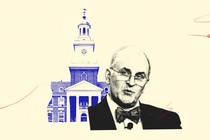Hubris of Biblical Proportions
5 min read
“Kings scarcely recognize themselves as mortals, scarcely understand that which pertains to man,” John Milton wrote, “except on the day they are made king or on the day they die.”
Russian President Vladimir Putin is 71; he’s been in power for 12 years and will leave a historical wreckage as his legacy. He’s not going anywhere of his own volition. Israeli Prime Minister Benjamin Netanyahu, despite vociferous protests, is hanging on by a thread to an office he has occupied for 15 nonconsecutive years. He is 74. Mahmoud Abbas, the president of the Palestinian Authority, is 88, and has been in that position for 19 years.
And here in the United States, President Joe Biden is 81 and running for reelection, despite a questionable performance in Thursday’s presidential debate. The Democratic Party, it seems, would rather save face than save the country. The Republicans haven’t put forward a new candidate, so we are subject once again to former President Donald Trump’s populist tirades and legal battles. He’s only 78.
Too many leaders stay in office long beyond their sell-by date. When they do, they risk turning their initial enthusiasm and energy for the work into a stubborn refusal to let the next leader bring fresh perspectives and a new vision. In their dogged attachment to the role, they can become too lackluster, too authoritarian, too glib, or too narcissistic. They care more about holding on than about what is best for their constituents.
I get it. It’s hard to let go of authority, to give up on the strategies not yet executed and goals not yet achieved. The privileges of power are also difficult to relinquish, from the small perks to the constant wash of sycophancy. And as a lifelong student of the Hebrew Bible, I know there’s nothing new about this.
The arc of leadership in the Hebrew Bible captures this predictable cycle: modesty, authority, prosperity, then insecurity. The pre-leadership questions are often the same: Am I worthy? Is there someone better suited to the task? Why me? We see this play out as early as the Exodus story, when Moses had the audacity to turn down God. Moses felt himself unworthy of leadership—a poor speaker, inexperienced, and unable to establish the people’s trust. He, at least, retained his humility until the end.
Much later, when Samuel told Saul he would be king, Saul literally hid behind the baggage at his inauguration. He was tall and good-looking—the right optics for politics—but ultimate responsibility was intimidating and scary. He shrank in its presence. The people grumbled about this odd choice of king: “How can this fellow save us?”
The Bible wants us to know that power changes people, that they come to enjoy the weight and clout of office and its many material and emotional benefits. Proverbs, in only one verse, captures the pleasure of power: “The king’s smile means life; his favor is like a rain cloud in spring.”
Saul had not worn the crown long when his incompetencies surfaced. He spiraled into poor judgment. He subverted God’s mandates and ignored Samuel’s warnings. The grumblers were correct; Saul could not save the people. There was a young warrior, however, who could. David was a singular talent, who defeated Goliath when others cowered. Enemies feared him. Maidens loved him. Despite this or because of it, King Saul was not prepared to step down. David’s early victories made Saul hang on even more tightly to his position.
Saul was not relieved to have a valiant successor. He was threatened and distressed. The David who played the lyre for Saul to calm his dark moods was the very person who made Saul unhinged and jealous. “All that he lacks is the kingship!” Saul complained. Saul tried to kill David many times, disregarding David’s sorely needed military talents while compromising his people’s safety and well-being. Greed in politics poisons governance.
Most telling is that although King Saul’s problems were evident, his ministers did not question Saul’s fitness for office. It was God and Samuel who took the kingship away from him, before his leadership caused more damage.
In a Talmudic passage that cites Saul, the sage Rabbi Joshua ben Peraḥya reflected on the changes wrought by leadership. When someone initially suggested that Rabbi Joshua take a leadership role, he was furious: “I would tie him up and place him in front of a lion out of anger for his suggestion.” He did not want to give up his scholarship for administration and bureaucratic influence.
But when Rabbi Joshua eventually assumed the role, his tune changed: “In response to anyone who tells me to leave the position, I will throw a kettle of boiling water at him out of anger.” His first hesitations morphed into aggressive territoriality. He was not prepared to let go of the role or its many benefits. At least Rabbi Joshua confessed his shortcomings.
Leaders powerful enough to get appointed or elected are often powerful enough to abuse the privilege. Competition spurs a cycle of insecurity. Rather than let go in the face of challenge, leaders strengthen their grip on power while losing their grip on reality. Like King Saul, they veer into defensiveness, ignore the voices of dissent, and become so distracted by a desire to stay in office that they stop doing the real work of governance. In the worst instances, they become as reckless as Saul, and perceive any resistance as disloyalty.
Leaders like this will never leave of their own accord. That is the work of those who can look beyond personality and focus instead on the position and the possibilities ahead. The selfish cost of staying taxes everybody. “How can this fellow save us?”
The greater part of valor and wisdom dictates that for the vitality of an organization, or indeed a polity, veteran leaders, at some point, need to step down gracefully and heed another verse from Proverbs: “Pride goes before ruin; arrogance, before failure.”



